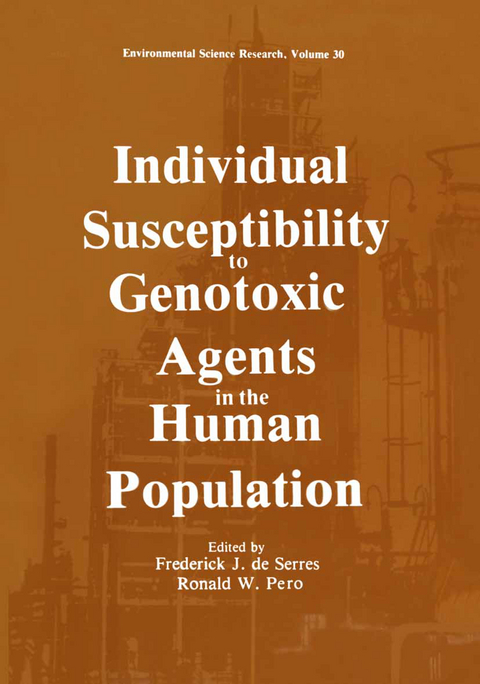
Individual Susceptibility to Genotoxic Agents in the Human Population
Springer-Verlag New York Inc.
978-1-4612-9709-3 (ISBN)
Session I: Genotoxic Substances and Variability in Human Disease.- Investigation of Genetic Hazards: Guidance from Occupational and Environmental Studies.- Epidemiology and Population Monitoring in Genetic Risk Assessment.- An Overview of Approaches for Genetic Monitoring of Humans.- Evaluation of Genotoxic Effects in Human Populations.- Session II: Metabolism of Genotoxic Agents in Human Cells and its Relevance to Risk Assesment.- On the Possible Significance of TCDD Receptor Based Assays in Attempts to Estimate Environmental Health Hazards.- Interindividual Differences in Monooxygenase Activities of Human Liver.- Involvement of Prostaglandin Synthetase in the Metabolic Activation of Chemical Carcinogens — Phenacetin as an Example.- The Use of Immunological and Molecular Biological Techniques in the Assessment of Occupational and Environmental Disease.- Interindividual Variation in the DNA Binding of Chemical Genotoxins Following Metabolism by Human Bladder and Bronchus Explants.- Session III: Genotoxic Testing on Somatic Cells in the Human Population.- Intrinsic Factors that Can Affect Sensitivity to Chromosome Aberration Induction.- Individual Variability in the Frequency of Sister Chromatid Exchange in Human Lymphocytes.- Variations in Mitotic Index and Chromosomal Aberration Rates in Women.- Micronuclei in Cultured Lymphocytes as an Indicator of Genotoxic Exposure.- Detection of Mutated Erythrocytes in Man.- Peripheral Blood Lymphocytes as Indicator Cells for in vivo Mutation in Man.- Discrimination between Spontaneous and Induced Mutations in Human Cell Populations by Use of Mutational Spectra.- Session IV: Evaluation of Body Tissues and Fluids as Indicators of Exposure.- Short Term Tests on Body Fluids.- Chemical Analysis of Human Samples: Identification andQuantification of Polychlorinated Dioxins and Dibenzofurans.- Hemoglobin as a Dose Monitor of Alkylating Agents: Determination of Alkylation Products of N-Terminal Valine.- Session V: Population Heterogeneity as a Modifier of Genotoxic response.- Variations in Sensitivity and DNA Repair in Human Cells Exposed to Genotoxic Agents.- Unscheduled DNA Synthesis Induced by N-Acetoxy-2-acetylaminofluorene as an Indicator of Risk from Genotoxic Exposures.- Individual Variation in DNA Repair in Human Peripheral Blood Monocytes.- Influence of Demographic Factors on Unscheduled DNA Synthesis as Measured in Human Peripheral Leukocytes and Fibroblasts.- Individual Variation in Benzo(a)pyrene Metabolism and Its Role in Human Cancer.- C-Band Variation in Hypertensive Men.- Session VI: Reproductive Effects of Genotoxic Exposures on the Human Population.- Methods for Evaluating the Effects of Environmental Chemicals on Human Spermatogenesis.- New Techniques for Detecting Chromosome Abnormalities in the Germ-Line in Man.- Epidemiologic Considerations in Assessing Adverse Reproductive Outcomes Following Genotoxic Exposures.- Session VII: Genotoxic Risk Monitoring of the General Population.- A Reference Population: For the Evaluation of Natural Occurring Inter-individual Variation in the Response to Genotoxic Agents.- Investigations of Smoking and Related Health Complications and Genotoxic Hazards in a Preventive Medical Population Program in Malmö, Sweden.
| Reihe/Serie | Environmental Science Research ; 30 |
|---|---|
| Zusatzinfo | 518 p. |
| Verlagsort | New York, NY |
| Sprache | englisch |
| Maße | 178 x 254 mm |
| Themenwelt | Sachbuch/Ratgeber ► Natur / Technik ► Garten |
| Naturwissenschaften ► Physik / Astronomie ► Allgemeines / Lexika | |
| ISBN-10 | 1-4612-9709-5 / 1461297095 |
| ISBN-13 | 978-1-4612-9709-3 / 9781461297093 |
| Zustand | Neuware |
| Haben Sie eine Frage zum Produkt? |
aus dem Bereich


